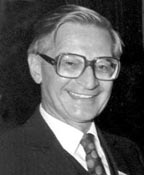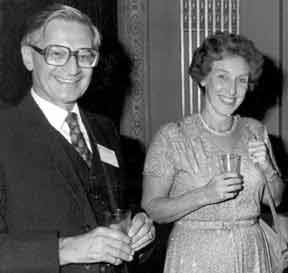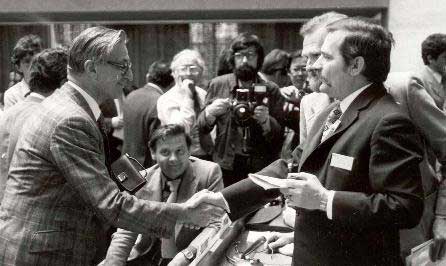![]()
![]()
![]()
![]()

|
JANUSZ? POST WAR ACTIVITIES
As mentioned above, Janusz? mother remained in Poland throughout the war and, using family contacts, Janusz managed to arrange for her to come to England after the war.
Cecile worked for the fledgling United Nations when it was founded in London in 1945 and she and Janusz? mother moved to New York in September 1946 when the UN moved there. Janusz had the option of returning to Poland but chose not to become part of the Soviet regime, probably seeing it, in human rights terms, as not unlike the Nazi regime so recently deposed.
He was nominated Consul of Poland at Strasbourg --- a position that he turned down, not being able to accept a comunist government in his home land.
Unable to be with Cecile and his mother in the United States, because of nationality reasons, he chose to go to Brazil and eventually joined them in New York in 1947.
Having researched this far into Janusz? life I decided to continue and present a detailed outline of his remarkable career, spanning the next forty years. A career that was particularly notable for his continuous striving for democratic principles and human rights.
For most of the following section I am indebted to the summary of Janusz' career contained in an article by 'Centro para La Defense Estudio de los Derechos Humanos', Madrid. (The Center for the Defence of Human Rights - CEDEHU.) but mainly to his wife Cecile.
As an introduction to this part of Janusz' life I can do no better than precis some of the opening comments made by the author of the CEDEHU article.
"I first came into contact with Janusz in 1983 when I spoke to him on the telephone about coming to our XIII RCC Congress. I could tell that he supported our ideals and that his experience, with the loss of his homeland to Communism, allied him to our cause.
He attended the Congress and again I could tell from our discussions of the great dedication of his life to that most sacred ideal of humanity, the full recognition of human dignity. I was also aware of the great support that he was prepared to give, over the years, to many other nations who had suffered oppression."

|
We saw on an earlier web page that Janusz' undergraduate study had been completed in England just after the war. His Post graduate study in the USA was in international public administration at The Woodrow Wilson School, Princeton University.
1948 - 1950 After arriving in New York Janusz was employed by European Import Export companies. He became Vice President of Imhauca, a Swiss American export company.
1951-- After attending the School of International Relations at Princeton University, he spent time in Europe taking part in meetings and conferences being organised on christian democracy. These were held in France, Belgium, Italy, San Marino, Switzerland, the Netherlands and the United Kingdom.
Many such meetings were organised by the "Nouvelles Equipes Internationales" under the leadership of Maurice Schumann (France) and Helmut Khol (Germany) discussions being on the creation of a christian democratic movement in Europe.
Janusz returned from these trips with a renewed and boundless energy to communicate these principles now to Latin America.
He started work for the "Christian Democrats of Central Europe", an organisation composed of exiled political leaders and wx-ministers of these countries occupied by the Soviet Union.
That same year he became a member of the International League for Human Rights and also a member of the International Association for Liberty and Democracy. His great knowledge of languages including Polish, Spanish, French, Portuguese, Italian and German made him ideally suited to such an international profile.
In all Janusz visited some 22 countries as he took part in international events.
Some of these include;
From 1953 he took part in ORIT Seminars in Mexico amd Costa Rica.
In 1954 he attended the III Catholic Seminar titled 'Rural Life in Panama'.
In 1955 he went to the Congress in Santiago in Chile.
In 1956 he attended the 1st International Conference of Christian democrats as co-ordinator between the delegations of Europe, Latin America and Africa. Rhis wasa very difficult time as the revolt in Hungry had been stifled by the Soviets and the Hungarians who were now in exile had met in New York and were striving to focus world attention on the dangerous situation in their homeland.
In 1957 He travelled to Sao Paolo and Venezuela to negotiate on behalf of the Christian Democrat leaders of COPEI (Comit? de Organizaci?n Pol?tica Electoral Independiente),who were imprisoned and whose political party had been banned by Perez Gimenez.
In 1958 Janusz attended the 2nd International Congress, held in Brussels as co-ordinator. He was an official observer at the elections of Venezuela in 1958 and was again involved with the World Conference of Christian Democrats which then became the "World Union of Christian Democrats".
In 1960 he visited Chile during the election. He was there in his capacity of negotiator for the Christian Democrats. On this occasion he was supporting Dr Raphael Caldez, President of Venezuela who wanted to give support to Edouardo Frei. It was to be the election of 1965 before Frei came to power.
Janusz's experience, skills and knowledge saw him elected,in 1966, as President of the Center for Democratic Action. As such he founded in Caracas, IFEDEC, an institute for the training and education students interested in the history and pronciples of christian democracy. In the 2001 there was held in Caracas, a commemorative meeting celebrating the founding of the Institute as well as the important role that Janusz had played in its creation. The meeting was attended by ex Presiden Rafael Caldera, and other personalities.

|
From 1968 to 1974 he was the President of the International Development and Relations Society with residences in Geneva and Vienna.
From 1975 he was the representative of the Christian Democrat Internatal, a Non-governmental organisation to the Human Rights Commission of the United Nations in Geneva.
In 1983 Janusz received the Order of Francisco de Miranda, 1st class, from the ex President of Venezuela, Herrera Campins, for his oustanding contribution to human rights and democratic ideals.
The summing up of Janusz extensive, important and above all humanitarian work can best be done by quoting verbatim from the CEDEHU article referred to earlier;
Janusz enjoyed the respect and admiration of personalities world wide because of his expertise and professionalism in the economic, social and political fields in the development of Latin America. He was,consulted by the White House, The State Department, The Senate, the AFL-CIO and numerous universities in both Europe and America.
Janusz died without seeing his country liberated from communism on the 25th of March 1985, in Paris, while working for the United Nations and is buried in the Cimetiere de Thais. He leaves his wife Cecile, his son Thierry and his daughter Christina.
Cameron comment
On a personal note I would comment that it was a great privilege to know Nigel and it has been an honour to research yet another great man of our time. For both men their greatness was not based on power or publicity but by simply working diligently away at their chosen career. Careers that, in their different ways, have affected people world wide.
Both Nigel and Janusz, unique in their own fields of endeavour, were greatly respected and rightly deserved the international reputations that they built up over the post war years. Although working in very different areas they appear to have had similar natures. Both were strong minded and proactive but always 'gentlemen' in the truest sense of the word and kind and considerate in character. Above all, both were strongly motivated by idealism.
It is such a pity that the two went their own separate ways after the war and didn't maintain contact. I am certain that they would have discovered that they had a great deal in common and, I am sure, would have enjoyed some wonderful discussions.
In our Tranter mailing list we often discuss papers that Nigel wrote under the title of 'What Ifs'. For example, 'What if Magaret had not been shipwrecked and entered Malcolm Canmore's life'.
As I write these final paragraphs to my research I am struck by a series of 'What ifs'.
'What if 'Delayed Action' hadn't been the first book of my collection'
'What if I hadn't been captivated by its unusual dedication and included it in my web page'.
'What if Christina hadn't searched Yahoo by typing in her father's name'
The answer is simple --- none of the above story would ever have been told.
Cameron Cunningham March 2004

